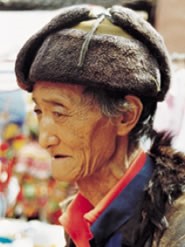Muzi in China

Photo Source:
Copyrighted © 2026
Operation China, Asia Harvest All rights reserved. Used with permission |
Send Joshua Project a map of this people group.
|
| People Name: | Muzi |
| Country: | China |
| 10/40 Window: | Yes |
| Population: | 11,000 |
| World Population: | 11,000 |
| Primary Language: | Muzi |
| Primary Religion: | Ethnic Religions |
| Christian Adherents: | 0.00 % |
| Evangelicals: | 0.00 % |
| Scripture: | Unspecified |
| Ministry Resources: | No |
| Jesus Film: | No |
| Audio Recordings: | No |
| People Cluster: | Tibeto-Burman, other |
| Affinity Bloc: | Tibetan-Himalayan Peoples |
| Progress Level: |
|
Introduction / History
Despite the fact that the Muzi have a different language and customs today, historians speculate that at one time they were part of the Muji people. Historians say that the two groups "diverged late in the Yuan Dynasty (1279-1367) when the Muji went to war with the Puwa of present-day Xibeile District."
Despite their similar names and even though both have been included under the Yi nationality in China, the Muzi are not the same people group as the Muji. Jamin Pelkey explains, "The origin and development of the Muzi people are baffling. Not only are their customs and eating habits remarkably different from the Muji on all sides of them, but their language is divergent enough to be placed in a completely separate language family!"
What Are Their Lives Like?
Unmarried Muzi youth and widows usually live together in a huafang - a communal house where they can come together for sexual unions and courtship. "They may also spend the night with each other in rooms built above their homes adjoining goat stables."
Every Muzi home has a fire-pit dug into the middle of the floor of the main room. Beside this fire-pit is a rock on which to place the cooking pot. The Muzi believe "this rock and the area around it to be sacred - being the area where the guardian god of the home and the ancestors reside. No one is allowed to step on this rock."
What Are Their Beliefs?
The Muzi set aside the first day of each third lunar month to worship the Dragon god. "On this day each Muzi village kills a pig, each family prepares fermented glutinous rice, and all gather around the altar at the sacred tree of the village to worship the dragon god. After the ceremonies the entire village feasts together on bean sprouts and pork. The dancing of the 'slap dance' and folk singing after the feast is reportedly lively, but the Muzi do not allow outsiders to participate. ... In history past the Muzi were acclaimed hunters and felt a need to appease the god of the hunt. In order to show their reverence, they would save the bones from every animal they killed and, after amassing a certain weight, would take them into the forest to dump the bones into a prepared hole. After burying the bones a Muzi hunter would pray to the god of the hunt for a rich supply of game."
The Muzi are completely unaffected by Christianity. Their isolated location and mind-set have separated them from the mainstream of Chinese society and, consequently, from any contact they might have with Christians.
What Are Their Needs?
Without the guidance of Christ, these people are like sheep without a shepherd. They need the good shepherd in their families and communities.
Prayer Points
Pray for the authority of Christ to bind hindering spiritual forces to lead them from darkness to light.
Pray for signs and wonders to happen among them and for great breakthroughs with a rapid multiplication of disciples and house churches.
Pray for bold workers who are driven by the love of the Holy Spirit to go to them.
Pray for an unstoppable movement to Christ among them.